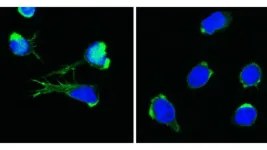(Press-News.org) Antarctic ice shelves have experienced only minor changes in surface melt rates over the past four decades, unlike the rapid increase in surface melt experienced by Greenland’s glaciers during the same time period, according to new research. The news is not cause for celebration just yet, though—the researchers expect Antarctic ice shelf surface melt rates to increase substantially in the coming decades due to rising global air temperatures.
Ice shelves are the parts of glaciers that extend into the ocean and float on top of seawater. In a new study published today in Geophysical Research Letters, glaciologists combined satellite microwave data with computer modeling to quantify how much surface melt occurred on all Antarctic ice shelves from 1980 to 2021.
The study was led by Alison Banwell, a glaciologist at the Cooperative Institute for Research in Environmental Sciences (CIRES), a partnership between the University of Colorado Boulder and the U.S. National Oceanic and Atmospheric Administration.
The results show Antarctic ice shelves overall have seen only minor changes in surface melt rates over the past 40 years, and the modeling results even show a small but significant decrease in melt rates during the study period. However, some ice shelves on the Antarctic Peninsula, which juts out of the continent toward South America, did experience exceptionally high surface melt in recent years, especially during the austral summer of 2019-2020.
The findings appear to be good news for the Antarctic region, but the researchers caution that they do expect Antarctic ice shelves to see higher surface melt in the coming decades. And surface melting is not the only threat ice shelves face; scientists tracking the Thwaites Ice Shelf in West Antarctica have found warm ocean water is eating away at the fragile ice shelf from below.
“As air temperatures increase over the coming decades, we're expecting a real increase in these surface melt rates up until the end of the century,” Banwell said. “So although we haven't seen much change in melt rates yet, we will see that to come. It just hasn't really kicked off yet.”
Ice shelves help stabilize upstream glaciers from otherwise flowing more rapidly into the ocean, but ice shelves are susceptible to surface melting and melting from warm ocean water below. The polar regions are particularly vulnerable to warming temperatures, and researchers have seen substantial melt on Greenland’s ice sheet over the past few decades, but Antarctica’s response to climate change has varied. Some areas of the continent, like the Antarctic Peninsula, have warmed dramatically, both other regions have not.
After studying the surface melt of one Antarctic ice shelf from 1980 to 2021, Banwell decided to look at all the continent’s ice shelves to see how (and if) they have changed over the past 40 years. Her new study is the first to combine satellite microwave data with a computer model to quantify surface melt over all the continent’s ice shelves. The satellite data showed how many days meltwater was present on each ice shelf, while the computer model estimated the volume of meltwater produced on each day there was meltwater present.
The results show that collectively, Antarctic ice shelves experienced hardly any change in surface melt over the past four decades and there was even a small but significant decrease in surface melt, according to the model the researchers used. However, the researchers do expect to see an increase in surface melt in the coming decades. Surface melt makes ice shelves less stable by thinning them and changing how they respond to stress.
“As temperatures increase…melt rates will rise, ice shelves are going to become much less stable as decades go on by the end of the century,” Banwell said.
END
Antarctic ice shelves experienced only minor changes in surface melt since 1980
But authors of a new CU Boulder-led assessment do expect surface melt to increase in the coming decades
2023-06-21
ELSE PRESS RELEASES FROM THIS DATE:
Hastings Center partners on AI project led by national academies
2023-06-21
The National Academy of Medicine (NAM) is partnering with a group of leading health, bioethics, equity, tech, patient advocacy, and research organizations, including The Hastings Center, to develop an Artificial Intelligence Code of Conduct (AICC).
Dr. Vardit Ravitsky, incoming president of The Hastings Center, who will serve on the steering committee, said, “we must urgently develop guidance for the ethical use of AI – perhaps the most transformative technology of our generation.” ...
CSU biologists document genome-level climate adaptation in endangered bird species
2023-06-21
As the climate changes, living things must adapt to new environmental conditions in one of two ways – either geographically or genetically. While it’s relatively simple for scientists to track and record a species’ geographic movements, proving their genetic adaptation over time can be much more difficult.
A new study led by Colorado State University researchers in Nature Climate Change is one of the first to document climate adaptation at the genomic level in a wild population. Specifically, the Southwestern Willow Flycatcher – an endangered migratory bird – has shown an increase in genetic variation ...
DNA test could broaden access to cervical cancer screening
2023-06-21
HOUSTON – (June 21, 2023) – Rice University bioengineers have demonstrated a low-cost, point-of-care DNA test for HPV infections that could make cervical cancer screening more accessible in low- and middle-income countries where the disease kills more than 300,000 women each year.
HPV, a family of viruses, infects nearly everyone at some point in their lives, often without symptoms. But more than a dozen types of HPV can cause persistent infections that result in cervical cancer, which is preventable and curable ...
Cancer drugs show potential in fight against malaria
2023-06-21
With malaria becoming increasingly drug-resistant, a team of UCF researchers is looking to use cancer drugs to accelerate the discovery of new life-saving therapies for the disease.
In a study funded by a 5-year $3.8 million grant from the National Institutes of Health, UCF molecular parasitologist Debopam Chakrabarti and cancer molecular biologist Ratna Chakrabarti are partnering with Nathanael Gray, co-leader of the cancer therapeutics research program at Stanford University and Elizabeth Winzeler, a malaria drug development expert from the University of California San Diego, to test cancer drugs for malaria-fighting ...
Newly discovered genetic defect disrupts blood formation and immune system
2023-06-21
(Vienna, 21.06.2023) In the quest to find the origin of the puzzling symptoms in four children, researchers from St. Anna Children's Cancer Research Institute, the CeMM Research Center for Molecular Medicine of the Austrian Academy of Sciences (ÖAW), and the Medical University of Vienna have discovered a completely new disease, linking disruptions of blood formation, the immune system, and inflammation. This groundbreaking discovery provides the basis for a better understanding of similar diseases. It is a milestone that the researchers have now published ...
New study reveals number and strength of head impacts, not concussions, drive CTE risk in football
2023-06-21
Does a football player’s number of concussions drive the risk of developing chronic traumatic encephalopathy (CTE)? In a new study of 631 deceased football players, the largest CTE study to date, scientists found that the number of diagnosed concussions alone was not associated with CTE risk. Instead, football players’ odds of developing CTE were related to both how many head impacts they received and how hard the head impacts were.
The study, conducted by researchers at Mass General Brigham, Harvard Medical School, and Boston University (BU), was published today in Nature Communications. It ...
ASPB Journals launch Author Travel Awards
2023-06-21
ROCKVILLE, MD - Authors whose work has been published in Plant Physiology or The Plant Cell, leading international society journals published by the American Society of Plant Biologists (ASPB), have a new option to support their travel to share their research with the scientific community. Funded by Plant Physiology and The Plant Cell, US$1,000 travel awards will be awarded to authors who have received invitations to give an oral presentation at any conference or scientific meeting around the world. Five US$1,000 awards are available in 2023 with more awards anticipated for 2024 ...
Scientists discover mechanism affecting heart development in Down syndrome
2023-06-21
Infants born with Down syndrome, the genetic condition caused by an extra copy of chromosome 21, or trisomy 21, are highly predisposed to congenital heart defects. It is estimated that nearly half of newborns with Down syndrome have a congenital heart malformation, and Down syndrome is recognized as the most common cause of congenital heart abnormalities. Despite many research efforts over several decades, the mechanisms by which trisomy 21 prevents proper formation of the heart during embryonic development have remained unknown.
A recent study by scientists ...
Combining twistronics with spintronics could be the next giant leap in quantum electronics
2023-06-21
Twistronics isn’t a new dance move, exercise equipment, or new music fad. No, it’s much cooler than any of that. It is an exciting new development in quantum physics and material science where van der Waals materials are stacked on top of each other in layers, like sheets of paper in a ream that can easily twist and rotate while remaining flat, and quantum physicists have used these stacks to discover intriguing quantum phenomena.
Adding the concept of quantum spin with twisted double bilayers of an antiferromagnet, it is possible to have tunable moiré magnetism. This suggests a new class of material platform for the next step in twistronics: ...
Omega-3 fatty acids linked to slower decline in ALS
2023-06-21
EMBARGOED FOR RELEASE UNTIL 4 P.M. ET, WEDNESDAY, JUNE 21, 2023
MINNEAPOLIS - People with amyotrophic lateral sclerosis (ALS) who eat more foods high in certain omega-3 fatty acids like flaxseed oil, walnuts, canola oil and pumpkin seeds may have a slower physical decline from the disease and may have a slightly extended survival. The study, which looked at the survival of people with ALS over the course of 18 months, was published in the June 21, 2023, online issue of Neurology®, the medical journal of the American Academy of Neurology. Researchers also found an omega-6 ...
LAST 30 PRESS RELEASES:
Novel camel antimicrobial peptides show promise against drug-resistant bacteria
Scientists discover why we know when to stop scratching an itch
A hidden reason inner ear cells die – and what it means for preventing hearing loss
Researchers discover how tuberculosis bacteria use a “stealth” mechanism to evade the immune system
New microscopy technique lets scientists see cells in unprecedented detail and color
Sometimes less is more: Scientists rethink how to pack medicine into tiny delivery capsules
Scientists build low-cost microscope to study living cells in zero gravity
The Biophysical Journal names Denis V. Titov the 2025 Paper of the Year-Early Career Investigator awardee
Scientists show how your body senses cold—and why menthol feels cool
Scientists deliver new molecule for getting DNA into cells
Study reveals insights about brain regions linked to OCD, informing potential treatments
Does ocean saltiness influence El Niño?
2026 Young Investigators: ONR celebrates new talent tackling warfighter challenges
Genetics help explain who gets the ‘telltale tingle’ from music, art and literature
Many Americans misunderstand medical aid in dying laws
Researchers publish landmark infectious disease study in ‘Science’
New NSF award supports innovative role-playing game approach to strengthening research security in academia
Kumar named to ACMA Emerging Leaders Program for 2026
AI language models could transform aquatic environmental risk assessment
New isotope tools reveal hidden pathways reshaping the global nitrogen cycle
Study reveals how antibiotic structure controls removal from water using biochar
Why chronic pain lasts longer in women: Immune cells offer clues
Toxic exposure creates epigenetic disease risk over 20 generations
More time spent on social media linked to steroid use intentions among boys and men
New study suggests a “kick it while it’s down” approach to cancer treatment could improve cure rates
Milken Institute, Ann Theodore Foundation launch new grant to support clinical trial for potential sarcoidosis treatment
New strategies boost effectiveness of CAR-NK therapy against cancer
Study: Adolescent cannabis use linked to doubling risk of psychotic and bipolar disorders
Invisible harms: drug-related deaths spike after hurricanes and tropical storms
Adolescent cannabis use and risk of psychotic, bipolar, depressive, and anxiety disorders
[Press-News.org] Antarctic ice shelves experienced only minor changes in surface melt since 1980But authors of a new CU Boulder-led assessment do expect surface melt to increase in the coming decades



